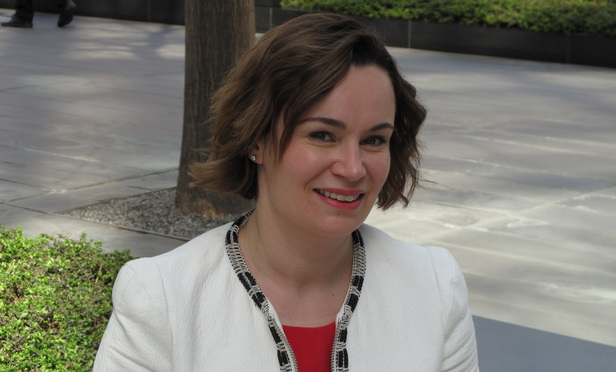In their shoes: Pinsent Masons and Mercer on rethinking the client-adviser relationship
Mercer's Lisa Tolaini and Pinsents' Isabel Nurse-Marsh on devising a new approach to day-to-day legal support
August 12, 2016 at 12:00 AM
6 minute read
"I don't want two pages of pros and cons; I want: 'This is the issue, this is what we think we should do – do you agree?'" says Mercer chief UK legal counsel Lisa Tolaini (pictured).
Tolaini and Sherrill Taggart, Mercer's chief legal counsel for the Euro-Pacific region, are clear on what they want from their outside counsel: price certainty, knowledge of their business, and quality of work.
Together with their relationship partner at Pinsent Masons, Isabel Nurse-Marsh, with whom they have worked for more than 10 years, Mercer and Pinsents have established an outsourcing arrangement – dubbed 'Getting Certainty' – that gives the HR consultancy access to what Tolaini describes as a 'remote secondee service', freeing up the in-house team to focus on more complex work.
Getting started
Mercer, a subsidiary of US professional services giant Marsh & McLennan, laid the foundations for Getting Certainty in 2009, when it carried out a project to revise a large number of its contracts and engagement letters. Pinsents was heavily involved in the project, which helped set a pattern for the relationship between the two.
"That project was on a fixed-fee basis, and that sowed the seed that led us to Getting Certainty. We already had the groundwork, it was a case of developing it," Taggart says.
Although Pinsents had been working for Mercer on a fixed-fee basis for some time, what came next required a great deal of work before it formally came into being in 2012.
Nurse-Marsh says: "Mercer had a lot of day-to-day business that needed to be looked after and they asked us to help them out with it. It involved a lot of discussions and planning and talking about different options before we came up with a plan."
The framework relied heavily on Pinsents' knowledge of the Mercer business, which had been honed by a long working relationship that has seen a steady stream of secondments from Pinsents to Mercer.
According to Tolaini, this close relationship allowed Pinsents to "get to know the way our team operates, the way the business operates and what the business expects from legal".
"They were able to take that knowledge back to Pinsents and help them develop a service that was able to provide a secondee service remotely – managing projects and managing cases without my team having to be the face of that advice," she adds.
She says the system allows Nurse-Marsh's team to "stand in the shoes" of the Mercer legal team and make decisions on their behalf. Tolaini says: "I don't want my team phoned up every time a small decision needs to be made."
In order to ensure that Pinsents would be able to make decisions independently but as if they were being supervised by Mercer, Nurse-Marsh and her team developed a 'playbook' based on their knowledge of Mercer's practices to help inform their decisions.
Getting more
The driver behind development of the new system will be familiar to every in-house lawyer in the post-recession world – the need to do more with less.
Taggart explains: "It is important for us to develop an arrangement with our external advisers that works to maintain the level of service and the quality of the service with fewer people."
Fixed-fee arrangements have grown in popularity in recent years, although Tolaini acknowledges they have their downsides.
Tolaini says: "I am not a great believer in fixed-fee arrangements – even though Getting Certainty is a sort of fixed-fee arrangement – because there is always the risk that people work to the fee. On the other hand, I want the certainty of knowing how much I am going to be spending, as managing the budget is a key function of ours."
In addition to the budget certainty, other key benefits of the Getting Certainty model include the ability to draw on extra resources at short notice, and the deep knowledge of Mercer's business that the close working relationship has allowed Pinsents to build up.
"Isabel's team have such a depth of understanding of our business that they pick up the phone and they know the person they are talking to, they understand the nature of the work they are doing and they understand the pressure that individual is facing," says Tolaini.
Getting results
While the arguments in favour of Getting Certainty are clear for Mercer, what is in it for Pinsents?
According to Nurse-Marsh, the key advantage is "knowing that there is a flow of work coming – that the clients trust you to do it and that it will be longer term".
As a firm with offices across the breadth of the UK, including Belfast, Manchester, Leeds and a trio of bases in Scotland, it has the ability to handle work at a wide variety of price points. "We try and do as much in lower cost centres where we can," Nurse-Marsh says.
The Getting Certainty model is now being looked at both as a framework for future work carried out by the two, and for Mercer, as an example of best practice for its other external advisers.
Tolaini says: "We don't have anything as sophisticated with other law firms, but to be able to point to this arrangement and say 'what can you offer us?' has been really important."
According to Taggart, who describes Pinsents as "one of the most innovative firms in this area", the two are looking to build upon the existing structure and take opportunities to work together in new areas.
"We have the framework now – it is a case of adapting it to project work as we go along. We know it works and the knowledge is there; it is a great framework to build on," says Taggart.
Related event: Corporate Counsel Forum Europe 2016 – The annual meeting place for Europe's leading general counsel. Click here to view the programme for the event.
This content has been archived. It is available through our partners, LexisNexis® and Bloomberg Law.
To view this content, please continue to their sites.
Not a Lexis Subscriber?
Subscribe Now
Not a Bloomberg Law Subscriber?
Subscribe Now
NOT FOR REPRINT
© 2025 ALM Global, LLC, All Rights Reserved. Request academic re-use from www.copyright.com. All other uses, submit a request to [email protected]. For more information visit Asset & Logo Licensing.
You Might Like
View All
‘A Slave Drivers' Contract’: Evri Legal Director Grilled by MPs

Serco Drops Three Firms Including Clifford Chance from Legal Panel

GCs Responsible for Gender Balanced Boardrooms Under New EU Rules
Trending Stories
- 1Lessons From Five Popular Change Management Concepts: A Guide for Law Firm Leaders in 2025
- 2People in the News—Jan. 15, 2025—Ballard Spahr, Brahin Law
- 3How I Made Office Managing Partner: 'Stay Focused on Building Strong Relationships,' Says Joseph Yaffe of Skadden
- 4Snapshot Judgement: The Case Against Illustrated Indictments
- 5Texas Supreme Court Grapples Over Fifth Circuit Question on State Usury Law
Who Got The Work
J. Brugh Lower of Gibbons has entered an appearance for industrial equipment supplier Devco Corporation in a pending trademark infringement lawsuit. The suit, accusing the defendant of selling knock-off Graco products, was filed Dec. 18 in New Jersey District Court by Rivkin Radler on behalf of Graco Inc. and Graco Minnesota. The case, assigned to U.S. District Judge Zahid N. Quraishi, is 3:24-cv-11294, Graco Inc. et al v. Devco Corporation.
Who Got The Work
Rebecca Maller-Stein and Kent A. Yalowitz of Arnold & Porter Kaye Scholer have entered their appearances for Hanaco Venture Capital and its executives, Lior Prosor and David Frankel, in a pending securities lawsuit. The action, filed on Dec. 24 in New York Southern District Court by Zell, Aron & Co. on behalf of Goldeneye Advisors, accuses the defendants of negligently and fraudulently managing the plaintiff's $1 million investment. The case, assigned to U.S. District Judge Vernon S. Broderick, is 1:24-cv-09918, Goldeneye Advisors, LLC v. Hanaco Venture Capital, Ltd. et al.
Who Got The Work
Attorneys from A&O Shearman has stepped in as defense counsel for Toronto-Dominion Bank and other defendants in a pending securities class action. The suit, filed Dec. 11 in New York Southern District Court by Bleichmar Fonti & Auld, accuses the defendants of concealing the bank's 'pervasive' deficiencies in regards to its compliance with the Bank Secrecy Act and the quality of its anti-money laundering controls. The case, assigned to U.S. District Judge Arun Subramanian, is 1:24-cv-09445, Gonzalez v. The Toronto-Dominion Bank et al.
Who Got The Work
Crown Castle International, a Pennsylvania company providing shared communications infrastructure, has turned to Luke D. Wolf of Gordon Rees Scully Mansukhani to fend off a pending breach-of-contract lawsuit. The court action, filed Nov. 25 in Michigan Eastern District Court by Hooper Hathaway PC on behalf of The Town Residences LLC, accuses Crown Castle of failing to transfer approximately $30,000 in utility payments from T-Mobile in breach of a roof-top lease and assignment agreement. The case, assigned to U.S. District Judge Susan K. Declercq, is 2:24-cv-13131, The Town Residences LLC v. T-Mobile US, Inc. et al.
Who Got The Work
Wilfred P. Coronato and Daniel M. Schwartz of McCarter & English have stepped in as defense counsel to Electrolux Home Products Inc. in a pending product liability lawsuit. The court action, filed Nov. 26 in New York Eastern District Court by Poulos Lopiccolo PC and Nagel Rice LLP on behalf of David Stern, alleges that the defendant's refrigerators’ drawers and shelving repeatedly break and fall apart within months after purchase. The case, assigned to U.S. District Judge Joan M. Azrack, is 2:24-cv-08204, Stern v. Electrolux Home Products, Inc.
Featured Firms
Law Offices of Gary Martin Hays & Associates, P.C.
(470) 294-1674
Law Offices of Mark E. Salomone
(857) 444-6468
Smith & Hassler
(713) 739-1250










